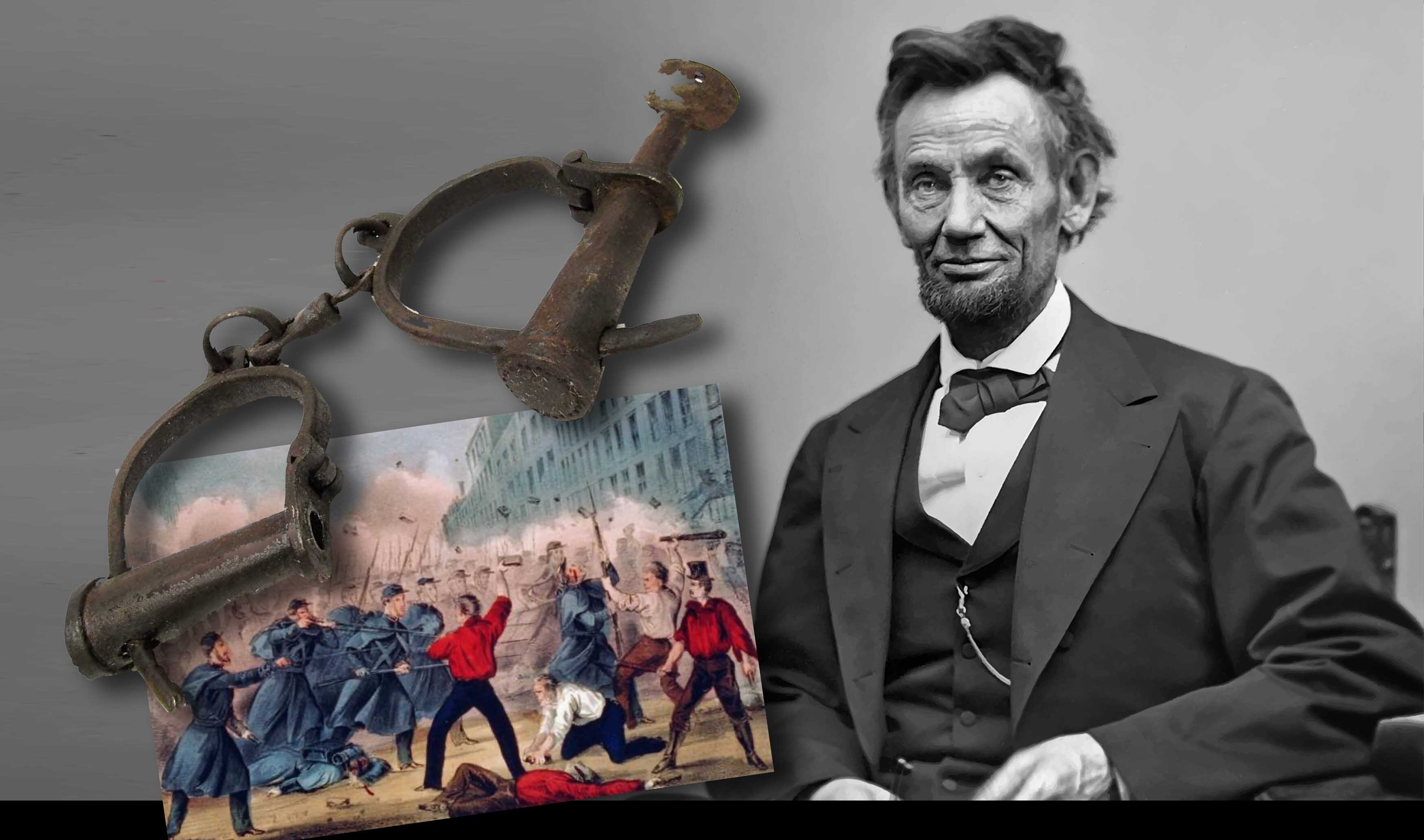Jailing Political Opponents: Abraham Lincoln and Habeas Corpus
Abraham Lincoln is known as “The Great Emancipator.” But not many people know that during the Civil War, he jailed as many as 2,000 political opponents without charges or trial. The story in this episode revolves around what happened in Baltimore, Maryland in 1861 and why it led to the Mayor, the Police Chief, the entire City Council and many more being jailed indefinitely in a suspension of the writ of Habeas Corpus. Then we chat with entertainer Brandon Anderson and play the quick quiz!

What if I told you there’s a line in the U.S. Constitution that can be used to imprison political opponents for no legitimate reason at all with no specific charges filed against them?
The Writ of Habeus Corpus in the United States dates back to the very beginning of our nation. The idea is inherited from English Common Law and it guarantees citizens the right to be held in jail ONLY if there specific, legitimate charges filed against you in court. King John in England signed the Magna Carta in 1215 and its 39th clause said “No man shall be arrested or imprisoned…except by the lawful judgment of his peers and by the law of the land.” And still today, this standard is the bedrock of the American legal system and the individual freedoms which it guarantees. It was James Madison who, in 1789, argued that Habeas Corpus should be adopted into the U.S. Constitution. In 1830, United States Supreme Court Chief Justice John Marshall said that the, quote “great object” of the writ of habeas corpus “is the liberation of those who may be imprisoned without sufficient cause.”
Article 1, section 9 of the United States constitution states the following: “The Privilege of the Writ of Habeas Corpus shall not be suspended, unless when in Cases of Rebellion or Invasion the public Safety may require it.”
And it was those last last fourteen words, “unless when in cases of rebellion or invasion the public safety may require it,” that the 16th President, Abraham Lincoln used to circumvent this long-standing right. This clause – known as “the suspension clause” has been invoked only 4 times in our nation’s history. I’ll tell you about the others later, but the most notable is the first time. It was 1861 and the nation had been thrown into what would become a deadly civil war.
Washington D.C., the Capital of the Union, was largely undefended. And it’s nearest large city, Baltimore, Maryland was full of people who Lincoln saw as Confederate sympathizers. It was a precarious situation early in the war.
At 2am on May 25 1861, a Maryland politician named John Merryman received a knock on his door. <knock sounds> When he opened the door, he encountered Union troops commanded by General William Keim. He was taken to Fort McHenry, where he was confined without being charged with a crime. Merryman was just one of more than 2,000 prisoners taken without being brought before a court.
The idea of putting political opponents in prison is not something that’s supposed to happen in America. And it seems like it’s often one of those things that gets brought up in modern politics. The insurrectionists that stormed the U.S. Capitol on January 6th are just now starting to see prison sentences. And people on the right are calling it political imprisonment. But that’s not what it is. What it is, are people being charged, prosecuted, having their day in court, and seeing held to the legal system of justice.
It’s something very different than 1861. There was no charge. There was no court, no judge.
John Merryman sat in a cell in Fort McHenry in Baltimore, closely guarded by Union troops. He hadn’t been charged with a crime. He was being imprisoned through the suspension of Habeus Corpus on orders of President Lincoln and Lincoln had a reason for this.
As I stated earlier, Baltimore was very close to Washington, D.C. – the command post of the Union Army. And those rioters and insurrectionists we saw in 2021 – that didn’t happen in 1861. No one was able to get close to the capitol building during the civil war. Which is amazing, considering the Confederate Capital of Richmond was only 95 miles away. It was important to protect the capital and Lincoln knew that there was a portion of residents in Baltimore who were sympathetic to the Confederate cause. Some people that far North were essentially fighting for the Confederacy. Men like Ross Winans, a railroad magnate who took some of the rail steel he had and made steel spikes for the expressed purposed of being used against abolitionist northerners. He was arrested and held at Fort McHenry until he pledged an oath to the Union. Uprisings were eminent – and some were already happening.
Just one week prior, there had been a riot in Baltimore. Anti-war Northern Democrats, known as Copperheads, had joined with Confederate Sympathizers to stop the passage of Union troops through Maryland. The fighting resulted in 4 union soldiers dead, 36 wounded. On the side of the rioters, there were 12 dead and hundreds wounded. These were actually the very first deaths due to the hostile action during the Civil War. It became known at the Pratt Street Massacre and Lincoln was panicked that it happened so close to home. The riot at Pratt Street wasn’t an isolated incident. Plans had been discovered of more disruptions by Confederate sympathizers. After the riot, the Maryland Legislature voted to stay in the Union, but to close rail lines through the state. The Governor had asked politician John Merryman to help blow up railroad bridges north of Baltimore.
Lincoln’s highest ranking General, Winfield Scott, wanted to bombard the city. Lincoln didn’t like that idea. Instead, his solution was to suspend the writ of habeas corpus. It didn’t end with John Merryman. Baltimore’s Mayor, George William Brown, was thrown in jail. He had supported the movement of Union troops through the city and generally sided with the Union, but was also accused of being wrapped up in the plot to destroy bridges. The police chief, the board of police, the entire Baltimore city council and Henry May, a sitting United States Congressman from Maryland were ALL arrested indefinitely without a trial. Judge Richard Carmichael was an outspoken Confederate sympathizer. Union troops dragged him from the bench of his circuit court, pistol whipped him, and sent him to Fort McHenry.
It wasn’t just politicians and police officials. Also locked up at Fort McHenry were at least a dozen newspaper owners and editors – included Frank Key Howard – the grandson of Francis Scott Key, who wrote the Star Spangled Banner about the very fort where his grandson would be imprisoned. Frank Key Howard wrote about his ordeal being held without charge and it at least two publishers were then arrested just for publishing it.
These imprisonments didn’t go without challenge. Some of these men, like Merryman and Mayor George William Brown, claimed to be firmly on the side of the Union – Mayor Brown even aided in helping the Union soldiers march through Baltimore. But with the rumors of the bridge destruction, Lincoln had to be sure. Merryman was a vocal secessionist whose claims of being loyal to the Union were disingenuous. He fought his imprisonment in court and Judge Roger Taney – this is the same man who gave us the horrible Dred Scot ruling, by the way – determined that Lincoln could not, in fact suspend habeas corpus and that it must be left to Congress. So Thadeus Stevens introduced a bill to indemnify the President and anyone carrying out the act of suspending the write of Habeas Corpus during that time. It passed with little opposition. All in all, more than 2,000 political prisoners were held at Fort McHenry without trial or even being charged. Even Thomas Holliday Hicks, the governor of Maryland who had once asked for the destruction of bridges north of Baltimore, voiced his support for the Union and said the following. Quote “I believe that arrests and arrests alone saved the State of Maryland not only from greater degradation than she suffered, but from everlasting destruction. I approved them then, and I approve them now; and the only thing for which I condemn the Administration in regard to that matter is that they let some of these men out.”
At the end of the Civil War, these suspensions of the writ of Habeas Corpus were rendered inoperative and no longer remained in effect. But since then, the Presidential suspension has been used a few additional times. After the war, President Grant used it to imprison members of the Ku Klux Klan. It was used for a short time in 1905 in an issue with the Philippines, during World War II to imprison suspected foreign saboteurs, and it was used by President Clinton in 1996 following the Oklahoma City bombing. But that’s where we start seeing these congressional acts using the word terrorism. The 1996 act was called the “Antiterrorism and Effective Death Penalty Act of 1996.” And the fight against terrorism is still being used to hold prisoners without trial in places like Guantanamo Bay Cuba. Petitions regarding Habeas Corpus are constantly being filed in court. After all – this is one of the bedrocks of American Freedoms.
When Lincoln jailed political opponents during the civil war, he was doing so to protect the Union. And the morality and legality of his decision has been debated ever since. What would have happened if a contingent of pro-confederate insurgents rose to power in Baltimore and attacked the nation’s capital? We don’t really know. And hopefully we’ll never have another situation in which it may be necessary.
Review this podcast at https://podcasts.apple.com/us/podcast/the-internet-says-it-s-true/id1530853589
Bonus episodes and content available at http://Patreon.com/MichaelKent
For 15% at SCOTTeVEST, visit http://scottevest.cwv7.net/a3VBZ
Sources for this episode:
https://www.baltimoresun.com/news/bs-xpm-2001-11-27-0111270102-story.html
https://www.history.com/this-day-in-history/president-lincoln-suspends-the-writ-of-habeas-corpus-during-the-civil-war
https://www.history.com/this-day-in-history/lincolns-suspension-of-habeas-corpus-is-challenged
https://en.wikipedia.org/wiki/Habeas_corpus
https://www.thoughtco.com/constitution-article-i-section-9-3322344
https://www.thoughtco.com/about-the-writ-of-habeas-corpus-3322391
https://www.law.cornell.edu/wex/habeas_corpus
https://en.wikipedia.org/wiki/Baltimore_riot_of_1861
https://www.youtube.com/watch?v=qJCacQkfXlc
https://constitutioncenter.org/interactive-constitution/interpretation/article-i/clauses/763

